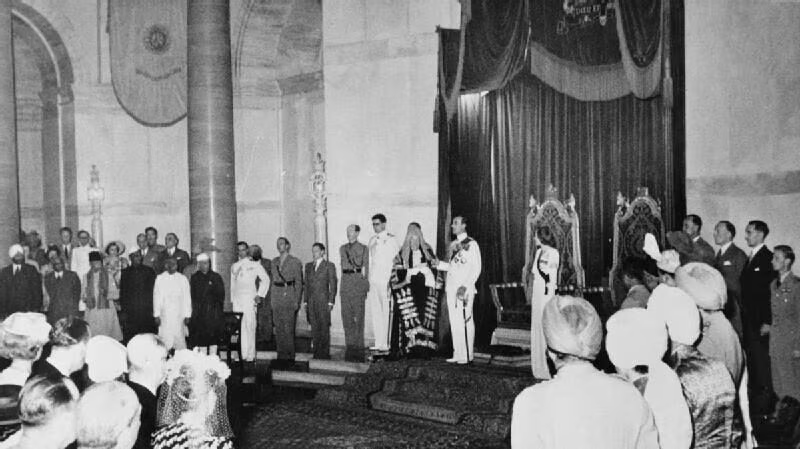
Cabinet Mission, Plan Balkan, Mountbatten Plan & Indian Independence Act of 1947
 Official
Official- 25/02/2016
- 7.0K views
- 3 minute read
Browsing Category
Modern Indian history is a tale of transformation, marked by the struggle for independence, social and political change, and the emergence of a nation on the world stage. The period from 1857 to the present has been shaped by colonial rule, the Indian independence movement, the partition, and post-independence developments. Let’s explore key events and phases that have defined modern India.
British colonial rule in India began in the early 17th century but became formalized under the British Crown after the Indian Rebellion of 1857, also known as the First War of Indian Independence or the Sepoy Mutiny. While the rebellion was unsuccessful, it marked the beginning of the end of direct Mughal and traditional Indian rule and the rise of a national consciousness.
Before 1857, the British East India Company controlled most of India’s territories. The company was given control over trade, revenue collection, and law enforcement, leading to its widespread influence.
The revolt of 1857 was a significant, though unsuccessful, uprising against British authority. Though primarily a military rebellion led by Indian soldiers (sepoys), it ignited widespread resentment against British rule. Following the revolt, the British government dissolved the East India Company and took direct control of India, marking the beginning of the British Raj.
In the late 19th century, India saw the rise of intellectual, social, and political reform movements aimed at improving society and challenging British colonial rule.
The late 19th century saw the emergence of Indian nationalism, with movements like the Indian National Congress (INC), founded in 1885. Early leaders like Dadabhai Naoroji, Gopal Krishna Gokhale, and Lala Lajpat Raiadvocated for Indian rights and self-rule.
Social reformers like Raja Ram Mohan Roy, Ishwar Chandra Vidyasagar, and Swami Vivekananda campaigned against social evils such as sati, child marriage, and caste discrimination. The Brahmo Samaj, Arya Samaj, and Theosophical Society played pivotal roles in promoting social change and modernizing Hinduism.
The early 20th century was marked by the intensification of the Indian independence movement, which sought to rid India of British colonial rule.
In 1905, the British partitioned Bengal, one of the most significant regions in India, to divide and rule. The move angered Indian nationalists and led to widespread protests. The partition was reversed in 1911, but the event played a crucial role in galvanizing the independence movement.
Mahatma Gandhi emerged as a central figure in the Indian independence movement after returning to India from South Africa in 1915. Gandhi’s philosophy of non-violence (ahimsa) and civil disobedience led to mass movements and protests across India.
After decades of struggle, India gained independence on August 15, 1947, but the victory was marred by the tragic Partition of India into two nations: India and Pakistan. The partition led to widespread communal violence, mass migration, and the loss of countless lives. The division was based on religious lines, with Pakistan becoming a Muslim-majority nation and India remaining secular with a Hindu majority.
Since independence, India has undergone dramatic political, economic, and social changes.
On January 26, 1950, India adopted its Constitution, making it a republic. The Constitution, drafted by Dr. B.R. Ambedkar and the Constituent Assembly, is the longest written constitution in the world. It provided for a democratic system of governance, guaranteeing fundamental rights to citizens.
In the first two decades after independence, India focused on nation-building, economic development, and social reforms. Nehru’s vision of a mixed economy led to the creation of public sector industries and five-year plans for economic growth. The Indian National Congress (INC) dominated the political scene during this period.
In 1991, under Prime Minister P.V. Narasimha Rao and Finance Minister Dr. Manmohan Singh, India embarked on a major economic liberalization process. This included devaluing the rupee, reducing import tariffs, and opening up the Indian economy to foreign investments. The reforms have had a profound impact, leading to rapid economic growth, the expansion of the technology sector, and India’s integration into the global economy.
India has witnessed multiple shifts in political power, with the INC ruling for several decades after independence. Over time, regional parties, coalitions, and new political forces like the BJP (Bharatiya Janata Party) have gained prominence.
India has undergone significant social and cultural transformation since independence.
India faces several challenges as it moves forward into the 21st century:
Modern India’s history is a tale of remarkable transformation, from colonial oppression to independence, and from a newly independent nation struggling with social and economic challenges to a global player with a rapidly growing economy. India’s journey is a complex one, marked by both triumphs and struggles, and its future will continue to shape the global landscape.